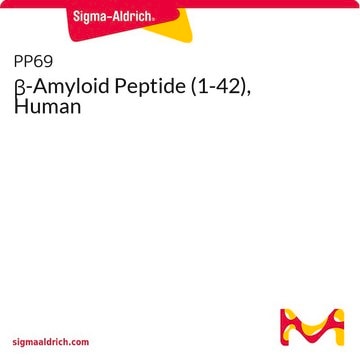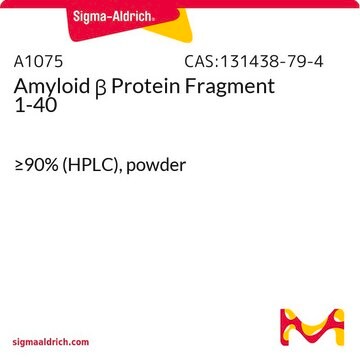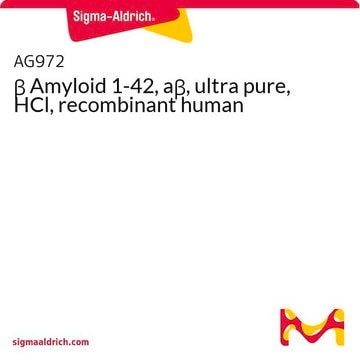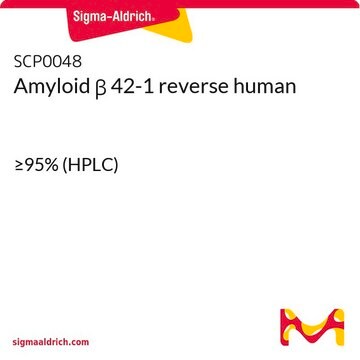AG968
β Amyloid 1-42, aβ, ultra pure, HFIP, recombinant human
Zaloguj sięWyświetlanie cen organizacyjnych i kontraktowych
About This Item
Kod UNSPSC:
12352202
eCl@ss:
32160405
NACRES:
NA.41
Polecane produkty
pochodzenie biologiczne
human
Poziom jakości
Próba
>97.0%
Postać
powder
producent / nazwa handlowa
Chemicon®
numer dostępu NCBI
numer dostępu UniProt
informacje o genach
human ... APP(351)
Opis ogólny
β Amyloid 1-42 is a derivative of integral membrane-bound amyloid precursor protein. It is the most important alloform of the Alzheimer′s peptide.
Zastosowanie
β Amyloid 1-42, aβ, ultra-pure, HFIP, recombinant human has been used:
- to study its effect on the activity of mitochondrial BKCa (mitoBKCa) channels in human astrocytoma cells through patch-clamp technique
- to study its effect on alteration in protein levels of dystrophic neurites (DNs) forming proteins in mouse neuroblastoma cells
- to induce Alzheimer′s disease in a rat model for experimental studies
Działania biochem./fizjol.
β Amyloid 1-42 causes neurotoxicity and is implicated in the pathogenesis of Alzheimer′s disease (AD). β Amyloid (βA) acts as a ligand for several receptors and other molecules involved in complex trafficking pathways in tissues and blood-brain barriers. βA along with amylin elevates cyclic adenosine monophosphate (cAMP) and Ca2+ in turn activates multiple signaling pathway mediators like mitogen-activated protein kinase (MAPK), protein kinase A/B, and cFOS. It acts as the main source of AD-associated neuroinflammation.
Informacje prawne
CHEMICON is a registered trademark of Merck KGaA, Darmstadt, Germany
This page may contain text that has been machine translated.
Kod klasy składowania
13 - Non Combustible Solids
Klasa zagrożenia wodnego (WGK)
WGK 1
Temperatura zapłonu (°F)
Not applicable
Temperatura zapłonu (°C)
Not applicable
Certyfikaty analizy (CoA)
Poszukaj Certyfikaty analizy (CoA), wpisując numer partii/serii produktów. Numery serii i partii można znaleźć na etykiecie produktu po słowach „seria” lub „partia”.
Masz już ten produkt?
Dokumenty związane z niedawno zakupionymi produktami zostały zamieszczone w Bibliotece dokumentów.
Klienci oglądali również te produkty
Annika Olsson et al.
Clinical chemistry, 51(2), 336-345 (2004-11-26)
To simultaneously study several biomarkers for Alzheimer disease (AD), we used the xMAP technology to develop and evaluate a multiparametric bead-based assay for quantification of beta-amyloid((1-42)) [Abeta((1-42))], total tau (T-TAU), and hyperphosphorylated tau [P-TAU((181P))] in cerebrospinal fluid (CSF). We compared
Stephanie J Soscia et al.
PloS one, 5(3), e9505-e9505 (2010-03-09)
The amyloid beta-protein (Abeta) is believed to be the key mediator of Alzheimer's disease (AD) pathology. Abeta is most often characterized as an incidental catabolic byproduct that lacks a normal physiological role. However, Abeta has been shown to be a
Ye Ji Lee et al.
Frontiers in molecular neuroscience, 16, 1150399-1150399 (2023-05-05)
Growth-associated protein 43 (GAP-43) is known as a neuronal plasticity protein because it is widely expressed at high levels in neuronal growth cones during axonal regeneration. GAP-43 expressed in mature adult neurons is functionally important for the neuronal communication of
Mohabbat Ahmadi et al.
Avicenna journal of phytomedicine, 9(5), 465-473 (2019-09-14)
Zataria multiflora (ZM) is a plant with ethnopharmacological value which was recently tested to reduce symptoms of Alzheimer's disease (AD). The aim of the present study was to determine the effect of ZM essential oil on spatial cognitive and noncognitive
Akiko Amano et al.
Journal of nanobiotechnology, 21(1), 36-36 (2023-02-02)
Although a large amount of evidence has revealed that amyloid β (Aβ), especially Aβ oligomers, protofibrils, and pyroglutamated Aβs, participate primarily in the pathophysiological processes of Alzheimer's disease, most clinical trials of anti-Aβ antibody therapy have never acquired successful efficacy
Nasz zespół naukowców ma doświadczenie we wszystkich obszarach badań, w tym w naukach przyrodniczych, materiałoznawstwie, syntezie chemicznej, chromatografii, analityce i wielu innych dziedzinach.
Skontaktuj się z zespołem ds. pomocy technicznej










